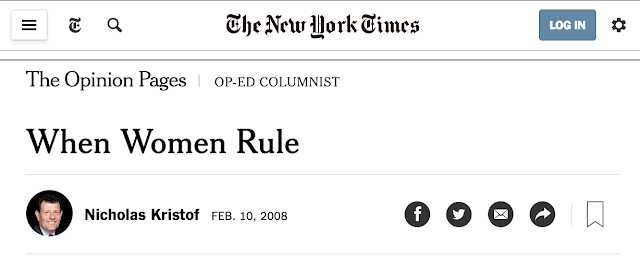Source: www.nytimes.com/2008/02/10/opinion/10kristof.html
Quotes:
“A notable share of the great leaders in history have been women: Queen Hatshepsut and Cleopatra of Egypt, Empress Wu Zetian of China, Isabella of Castile, Queen Elizabeth I of England, Catherine the Great of Russia, and Maria Theresa of Austria.”
“Scholars find that women, compared with men, tend to excel in consensus-building and certain other skills useful in leadership. If so, why have female political leaders been so much less impressive in the democratic era?”
“In monarchies, women who rose to the top dealt mostly with a narrow elite, so they could prove themselves and get on with governing. But in democracies in the television age, female leaders also have to navigate public prejudices — and these make democratic politics far more challenging for a woman than for a man.”
“In particular, one lesson from this research is that promoting their own successes is a helpful strategy for ambitious men. But experiments have demonstrated that when women highlight their accomplishments, that’s a turn-off. And women seem even more offended by self-promoting females than men are.”
“A woman can be perceived as competent or as likable, but not both.”
“Clothing and appearance generally matter more for women than for men, research shows. Surprisingly, several studies have found that it’s actually a disadvantage for a woman to be physically attractive when applying for a managerial job. Beautiful applicants received lower ratings, apparently because they were subconsciously pegged as stereotypically female and therefore unsuited for a job as a boss.”
“An M.I.T. economist, Esther Duflo, looked at India, which has required female leaders in one-third of village councils since the mid-1990s. … by objective standards, the women ran the villages better than men. For example, women constructed and maintained wells better, and took fewer bribes. Yet ordinary villagers themselves judged the women as having done a worse job, and so most women were not re-elected. That seemed to result from simple prejudice.”
“Modern democracies may empower deep prejudices and thus constrain female leaders in ways that ancient monarchies did not.”
